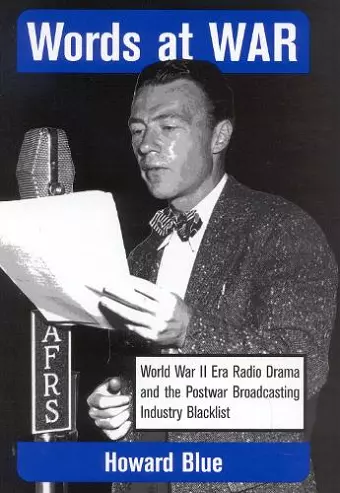Words at War
World War II Era Radio Drama and the Postwar Broadcasting Industry Blacklist
Format:Hardback
Publisher:Scarecrow Press
Published:19th Nov '02
Currently unavailable, and unfortunately no date known when it will be back

Words at War describes how 17 radio dramatists and their actors fought a war of words against fascism abroad and injustice at home. Beginning in the late 1930s, the commercial networks, private agencies, and the government cooperated with radio dramatists to produce plays to alert Americans to the Nazi threat. They also used radio to stimulate morale. They showed how Americans could support the fight against fascism even if it meant just having a "victory garden."
Simultaneously as they worked on the war effort, many radio writers and actors advanced a progressive agenda to fight the enemy within: racism, poverty, and other social ills. When the war ended, many of these people paid for their idealism by suffering blacklisting. Veterans' groups, the FBI, right-wing politicians, and other reactionaries mounted an assault on them to drive them out of their professions. This book discusses that partly successful effort and the response of the radio personalities involved.
This book discusses commercial drama series such as The Man Behind the Gun, network sustained shows such as those of Norman Corwin, and government-produced programs such as the Uncle Sam series. The book is largely based on the author's interviews with Norman Corwin, Arthur Miller, Pete Seeger, Arthur Laurents, Art Carney and dozens of others associated with radio during its Golden Age. It also discusses public reaction to these broadcasts and the issue of blacklisting.
Words at War weaves together materials from FBI files and materials from archives around the country, including the Academy of Motion Picture Arts and Sciences, the National Archives and a dozen university special collection libraries, to tell how the nation used a unique broadcast genre in a time of national crisis. Readers in the era of the current World Trade Center terrorism crisis will be particularly interested to read about censorship, scapegoating, and the government's role in disseminating propaganda and other issues that have once again
Wonderful...without question, Mr. Blue's book illuminates every aspect of that Golden Age. * Film & History: An Interdisciplinary Journal *
Fascinating...Recommended. * Choice Reviews *
...reveals the previously unheralded role of the American Jewish Committee * American Jewish Committee Newsletter *
Exceptional! * Today's Books *
A nonfiction book with superb research...a fascinating and highly readable book about a major period in the history of both the nation and radio. * Radio Recall *
This may well be the best book on American radio ever written. Blue has captured the vividness of network radio in its
golden era, meeting the crises of war with intelligence as well as drama (and comedy); and the now forgotten national tragedy of Cold War era crackdown on the very creators of the best programs. Radio has never recovered, and now we know the reasons.
A Tour de force of research and writing...full of creative and complex characters...Howard Blue is to be congratulated on the writing and publication of his book. He has retrieved a valuable story and begun a long and complex academic investigation into the role of radio drama as propaganda and the value of audio drama texts in cultural studies. -- Tim Crook, Goldsmiths, University of London
Ultimately, it is a chilling statement about censorship and scapegoating, one that increases the reader's sense of incredulity over how the nation could have so rapidly descended to such an iniquitous level following a war whose very essence was grounded in a desire to protect freedom from tyranny. This is an important study, one that should be a required reading in programs in journalism. * Communication Booknotes Quarterly *
[Blue] is at his impassioned best in describing the contents of wartime radio drama from the perspective of authors now in their nineties who remember their youthful wartime work with evident pleasure. * Journal of American History *
...Blue has done an admirable job of showing that Americans were bombarded daily with many perspectives, helping them to make sense of their world. His thought-provoking book indicates that much work remains to be done, especially for comparable studies on other media industries. Just as the wartime radio broadcasters dramatized serious subjects that appealed to wide audiences, Blue has done likewise. As a freelance writer and educator, he has written a book full of anecdotes to satisfy old-time radio enthusiasts but also has provided a valuable resource suitable for media scholars. One thing is clear: Words at War has proven that the drama away from the microphone was every bit as remarkable as the drama transmitted into American homes. * Journal of Cold War Studies *
Anyone interested in the impact of American Communists and fellow travelers on mass media will find Words at War extremely rewarding. Howard Blue spotlights a medium largely neglected in the literature on the blacklist. * American Communist History *
...a layered and intriguing work....this marvelous book...reminds us that the Second World War was as much a battle of ideas as of troops and weapons. * Jhistory *
Howard Blue is to be congratulated on the writing and publication of his book. He has retrieved a valuable story and begun a long and complex academic investigation into the role of radio drama as propaganda and the value of audio drama texts in cultural studies. * The Radio Journal *
ISBN: 9780810844131
Dimensions: 221mm x 151mm x 35mm
Weight: 735g
368 pages